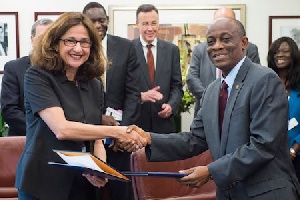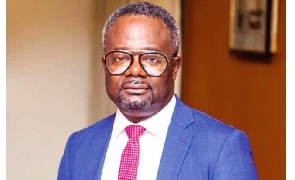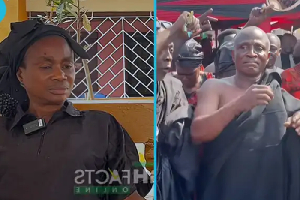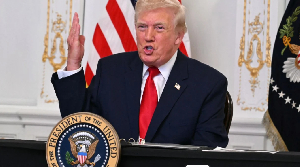The International Monetary Fund (IMF) is reviewing Ghana’s performance under the three-year economic programme signed between the West African country and the Bretton Wood Institution.
The IMF board review meeting was supposed to have taken place on December 18, 2015, but was postponed to Wednesday 13 January 2016. At the meeting with the IMF team are President John Dramani Mahama; Finance Minister Seth Terkper; Bank of Ghana Governor Henry Kofi Wampah; Dr. Kwesi Botchwey, Chairman of the National Development Planning Commission; other senior officials; and the donor community.
If the board gives its approval after Wednesday’s meeting, the IMF will transfer US$114,000,000 to the Bank of Ghana per the programme. The government of Ghana has so far received US$259.8 million in two tranches. US$144.8 million was the first tranche to hit the BoG’s account in April last year. It was followed by US$115 million paid in August 2015.
The IMF had its second review in November last year and expressed satisfaction with Ghana’s implementation of the three-year bailout plan, so far.
The assessment came after a team from the Bretton Wood institution, led by Joël Toujas-Bernaté, visited Ghana from October 21–November 5, 2015, to hold discussions on the second review of the country’s financial and economic programme supported by the IMF’s Extended Credit Facility (ECF).
The IMF in February last year approved an amount of $940 million towards rescuing Ghana’s ailing economy.
At the time, Toujas-Bernate said the country was to be supported with an amount of “SDR 664 million (around US$940 million), or 180 percent of Ghana’s IMF quota.”
The agreement aimed at restoring debt sustainability through fiscal discipline and hinged on three main priorities which included: “Restraining and prioritising public sector spending, increasing tax collection and strengthening the effectiveness of the Central Banks monetary policy role.”
The Fund’s report after the second review said: “Implementation of the programme has so far been satisfactory with all end-August 2015 performance criteria met. Despite a difficult global environment, economic outcomes have been broadly as anticipated, with growth estimated at around 4 percent during the first half of the year and inflation at around 17 percent. In line with the programme, the fiscal deficit is expected to decline to 7.3 percent of GDP in 2015, down from 10.2 percent of GDP in 2014. The authorities have also made progress in implementing fiscal structural reforms, albeit at a slower pace than expected in some areas. The mission welcomes the steps taken by the government in addressing payroll irregularities and advancing public financial management reform.
“Looking ahead, given the high level of public debt and financing constraints, the planned fiscal adjustment under the programme will be strengthened in 2016. The budget will also face additional spending needs from the (one-off) costs related to next year’s elections and a nominal wage bill increase now projected to be slightly higher than envisaged under the programme while earmarking of revenues for statutory funds continues to reduce budgetary flexibility.
“Recognising these challenges, the authorities, after discussions with the mission, prepared a package of revenue and spending measures for the 2016 budget to bring the fiscal deficit down to 5.3 percent of GDP next year, instead of 5.8 percent envisaged in the programme. Steps to contain losses in state-owned enterprises will also be particularly important to prevent additional fiscal pressures.
“Further fiscal adjustment along with tight monetary policy should help to restore macroeconomic stability. Building on its recent progress to improve the effectiveness of its inflation targeting framework, the Bank of Ghana remains committed to adjusting the monetary policy stance, as necessary, to bring inflation down toward its medium-term objective. This, together with the recent build-up of foreign exchange reserves, should also contribute to reducing the volatility of the cedi.
“The IMF Executive Board is tentatively expected to consider the review by the end of the year after finalisation of the required documentation."
Business News of Thursday, 14 January 2016
Source: classfmonline.com













